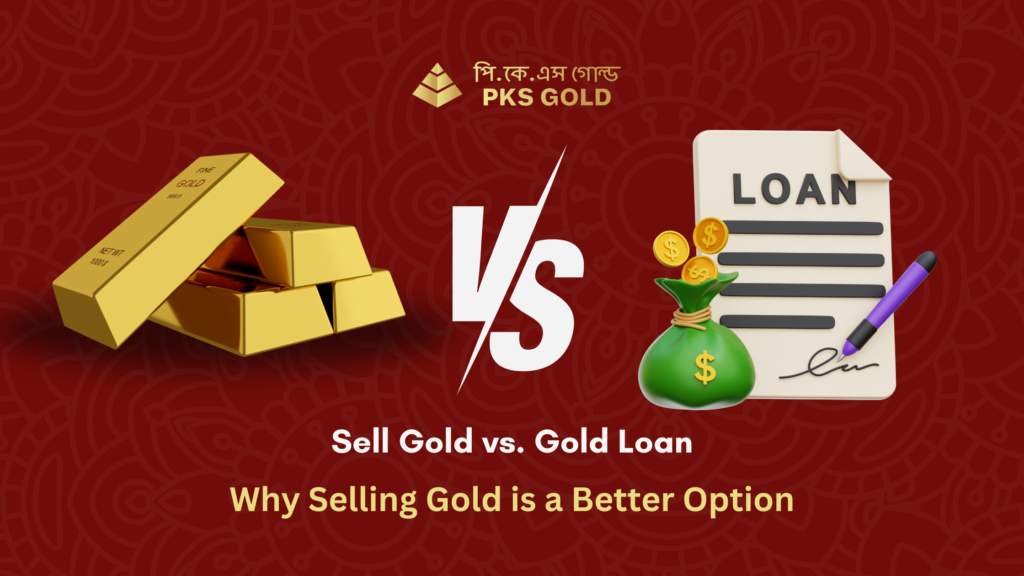Gold has long been a trusted financial asset, often serving as a backup during times of need. When faced with financial emergencies, people typically consider two options: selling gold or taking a gold loan. While both options have their merits, selling gold emerges as the better choice for those who want a hassle-free and debt-free solution.
In this blog, we will explore the advantages and disadvantages of both selling gold and taking a gold loan, with a focus on why selling gold is the superior option.
Sell Gold
Selling gold involves exchanging your gold items for cash, providing immediate liquidity. It is a simple and straightforward process that eliminates financial liabilities.
Advantages of Selling Gold
Instant Cash Without Obligations:
Selling gold provides quick access to funds without any future repayment burden. Once the transaction is complete, the money is yours to use as needed.
No Interest or Hidden Costs:
Unlike a gold loan, selling gold does not involve interest payments, processing fees, or additional charges.
Market-Driven Profit:
During periods of high gold prices, selling your gold can yield substantial returns. This is particularly beneficial when the gold’s market value exceeds your expectations.
No Risk of Repossession:
Once sold, there’s no risk of losing the asset due to missed payments, as can happen with a gold loan.
Simpler Process:
Selling gold is a straightforward process with minimal documentation. Reputable buyers offer on-the-spot evaluations and payments.
Eliminates Clutter:
If your gold is in the form of old, unused jewellery or broken ornaments, selling it is an excellent way to declutter while gaining financial benefits.
Disadvantages of Selling Gold
Permanent Loss of Asset:
Selling gold means parting with your precious items permanently. If the gold holds sentimental value, this can be a drawback.
Lower Value for Impure Gold:
Buyers typically deduct making charges and base the price on the gold’s purity, which may reduce your payout.
Tax Implications:
Profits from selling gold may be subject to capital gains tax, depending on how long you’ve held the asset.
Gold Loan
A gold loan involves pledging your gold as collateral to secure a loan from a financial institution. The lender evaluates the gold’s value and disburses a loan amount based on its market price.
Advantages of a Gold Loan
Retain Ownership:
A gold loan allows you to retain ownership of your gold, provided you repay the loan on time.
Lower Interest Rates:
Compared to unsecured loans, gold loans usually come with lower interest rates.
Quick Access to Funds:
Gold loans are processed quickly with minimal documentation, making them a convenient option during emergencies.
Flexible Repayment Options:
Lenders often provide options like interest-only EMIs or bullet repayments.
Disadvantages of a Gold Loan
Risk of Losing Gold:
If you fail to repay the loan on time, the lender has the right to auction your gold to recover their money.
Debt Obligation:
Taking a gold loan means entering into a financial commitment. You will need to repay the principal amount along with interest within the stipulated tenure.
Hidden Charges:
Gold loans may include processing fees, valuation charges, and penalties for early repayment or defaults.
Loan-to-Value (LTV) Limitations:
Regulatory caps (typically 75%-90% of the gold’s market value) mean you cannot access the full value of your gold.
Emotional Stress:
Pledging gold, especially sentimental items, can cause emotional discomfort, especially if repayment becomes difficult.
Why Selling Gold is a Better Option
While both options provide financial relief, selling gold has distinct advantages that make it a better choice, particularly for those who prefer a debt-free solution.
1. No Debt or Interest Burden
Selling gold eliminates the need to repay a loan, avoiding interest costs and potential stress. You receive immediate cash without worrying about future obligations.
2. Permanent Financial Relief
Selling gold provides a one-time solution to financial problems. Unlike a gold loan, which may lead to repeated cycles of borrowing and repayment, selling gold closes the chapter.
3. No Risk of Losing Gold
With a gold loan, failure to repay can result in losing your asset through auction. Selling gold ensures you don’t face the anxiety of repossession.
4. Maximize Value in High Markets
If gold prices are favourable, selling gold allows you to capitalize on market trends and maximize your returns, which isn’t possible with a gold loan’s LTV restrictions.
5. Avoid Complexities
Gold loans involve terms, conditions, and hidden charges that can complicate the borrowing experience. Selling gold is straightforward, with no strings attached.
Conclusion
While a gold loan can provide temporary financial relief, selling gold is the smarter choice for those seeking a permanent solution without the burden of repayment or interest. It offers immediate cash, no liabilities, and the opportunity to maximize value during favorable market conditions.
If you’re facing financial challenges and have unused gold assets, consider selling them to reputable buyers. This will provide you with a stress-free, debt-free way to navigate your financial needs effectively.

